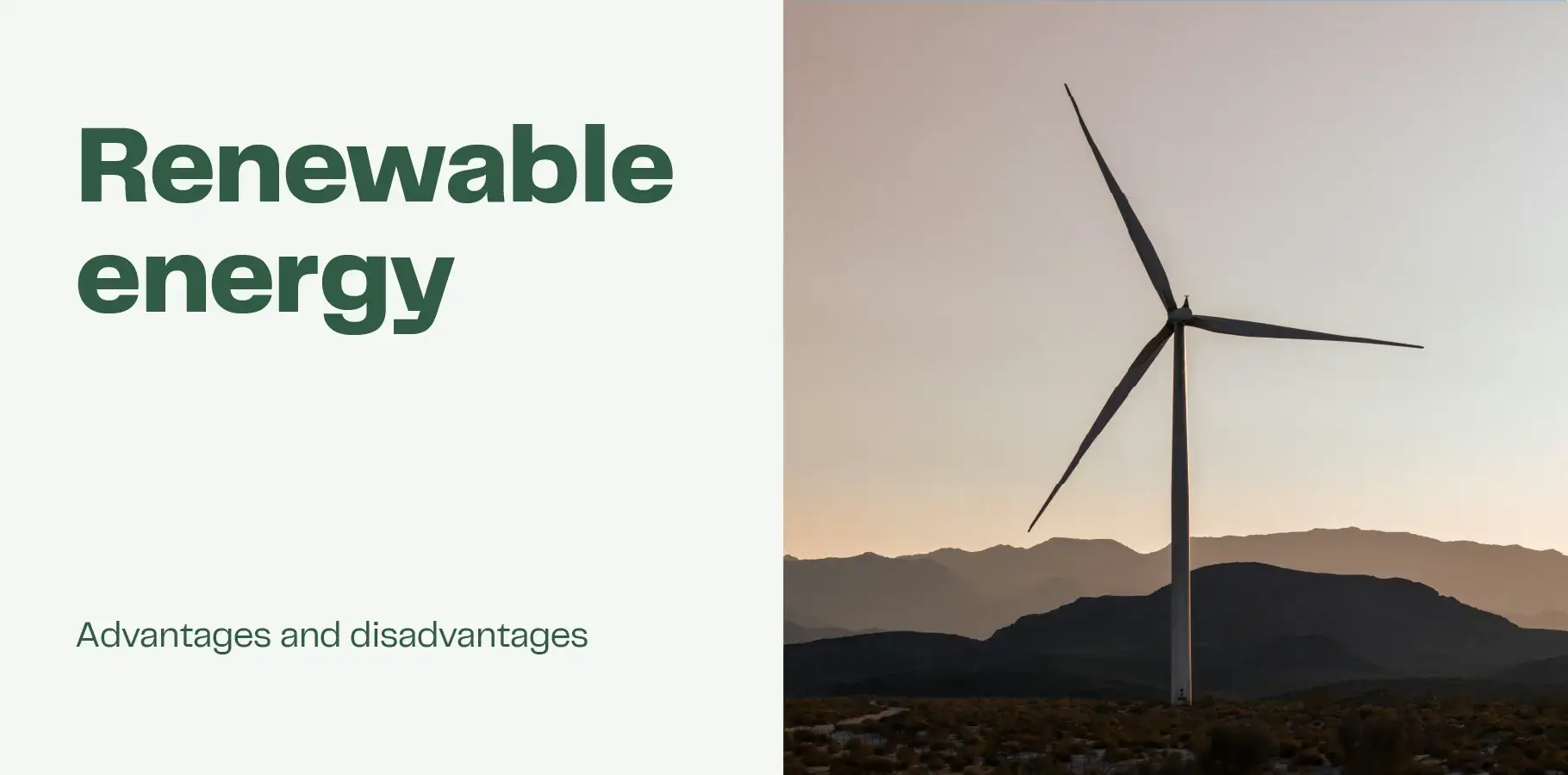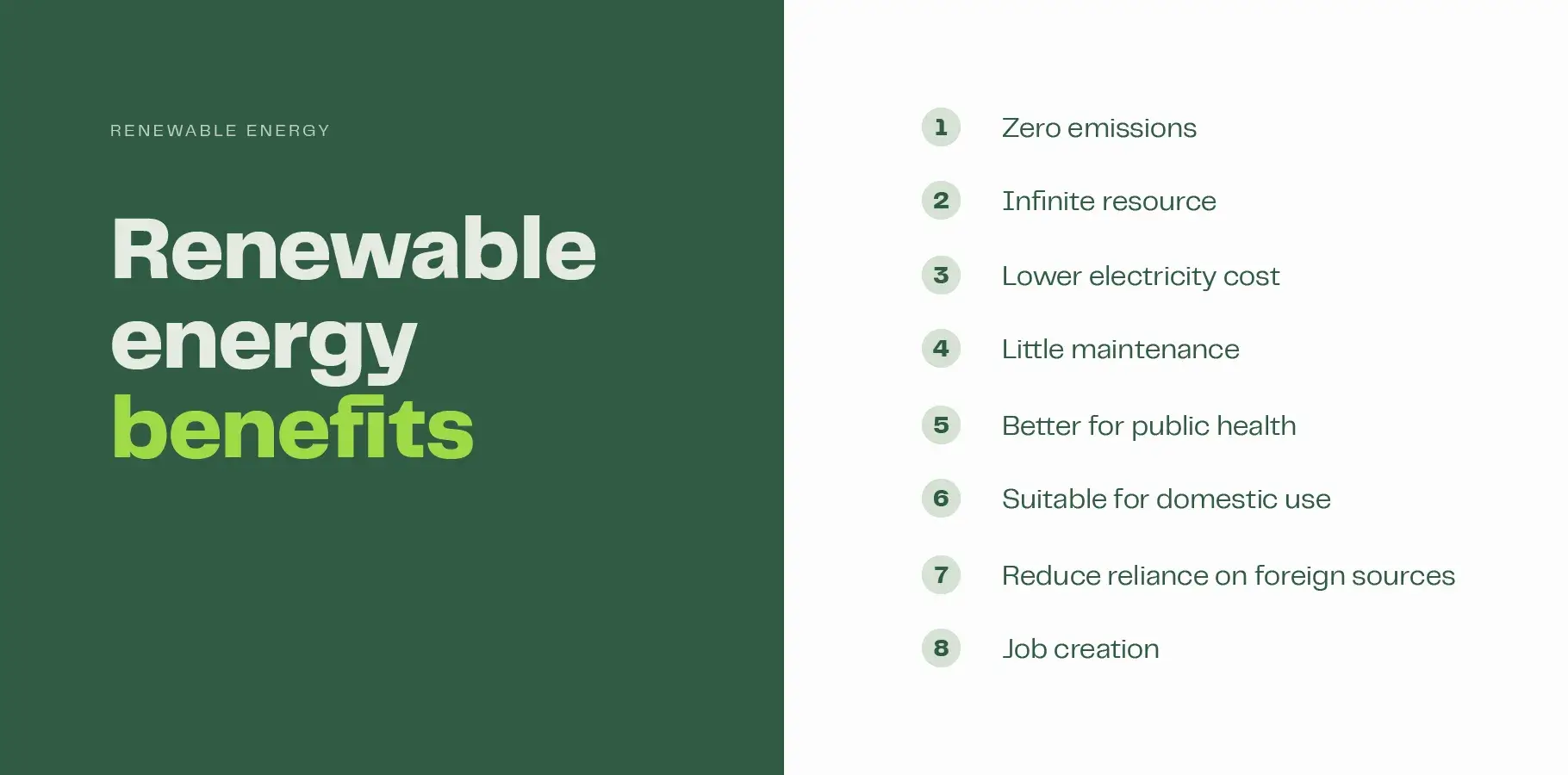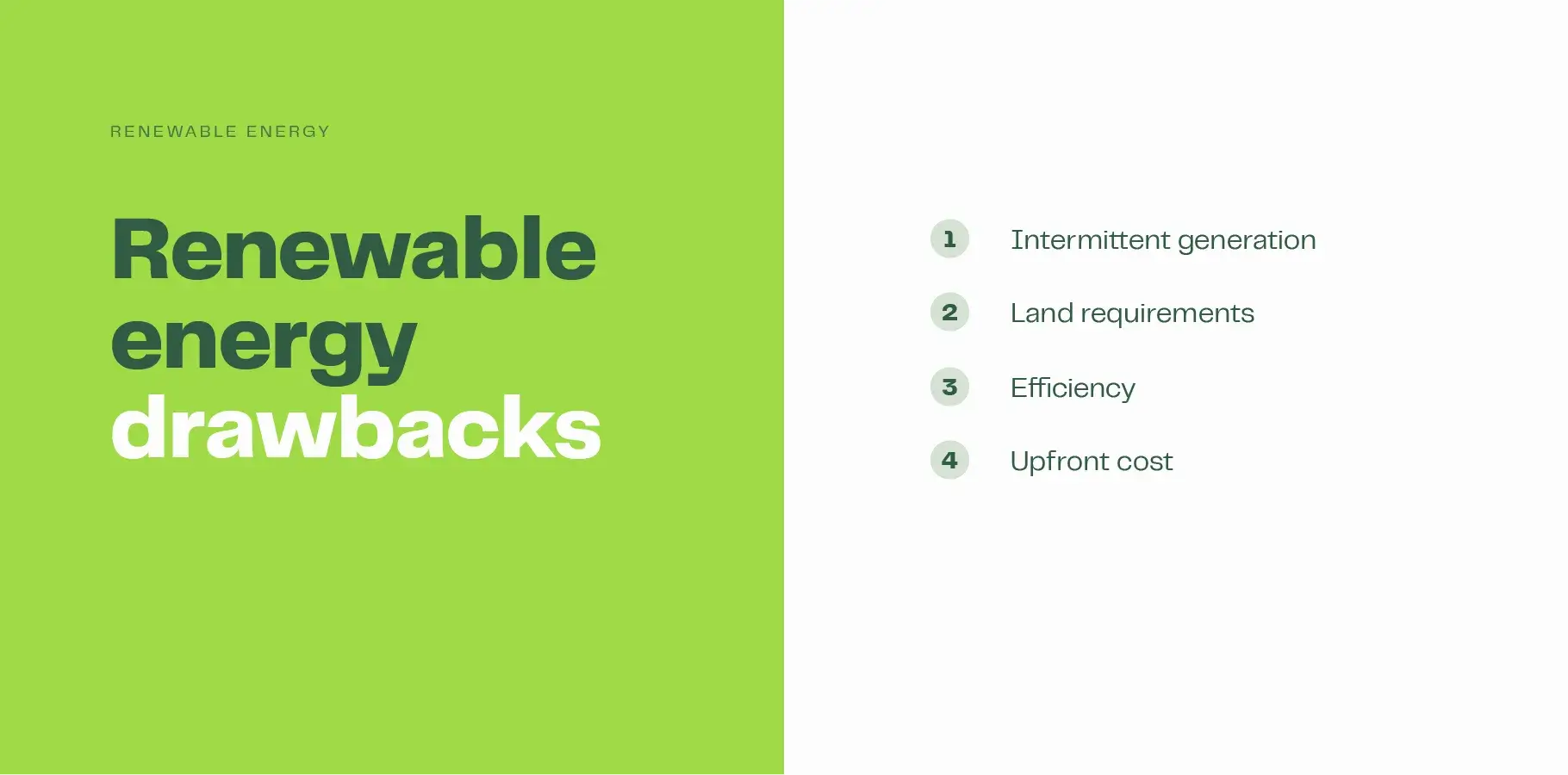- Blog
- Renewable energy
- Advantages and disadvantages of renewable energy
The advantages and disadvantages of renewable energy
- Renewable energy
- 3 min read

Renewable energy is quickly becoming the world’s cheapest and most popular source of electricity as the world accelerates our transition away from fossil fuels. Renewable energy is energy derived from sources that do not diminish over time like sunshine, wind and water.
As we continue our efforts to reduce carbon emissions, there are some important advantages and disadvantages of renewable energy that are helpful to understand.
Popular sources of renewable energy
There are different sources of renewable energy; solar, wind power, hydroelectric energy, geothermal and bioenergy. The most popular forms of renewable energy are solar, wind and hydroelectric, and our list of advantages focuses on these relatively more accessible sources.
Benefits of renewable energy

There are many benefits that renewable energy have over traditional fossil fuel sources, including:
- Zero emissions – great for the environment
- By definition, renewable energy is an infinite resource that will not deplete
- Lower cost of electricity
- Require little maintenance
- Better for public health
- Renewable sources can be suitable for domestic use
- Reduces reliance on foreign energy sources
- Job creation
1. Zero emissions – renewables are great for the environment
Renewable energy converts a natural resource into clean electricity without producing any carbon emissions or pollutants.
2. By definition, renewable energy is an infinite resource that will not deplete
Renewable energy is generated from resources that do not deplete over time. There will always be an abundance of resources available for humankind to harvest.
3. Lower cost of electricity
Renewables, particularly solar and wind, lower the cost of electricity. Solar panels can you save you considerable amounts by lowering your electricity bill.
4. Require little maintenance
Renewable forms of energy typically require little maintenance.
5. Better for public health
Energy generated from renewable sources is better for our public health. As well as the significant environmental advantages of lower greenhouse gas emissions, far fewer pollutants are emitted leading to cleaner air free of carbon and sulfur compounds associated with fossil fuel sources. Studies in the United States estimate clean energy can deliver public health benefits in the realm of $200 million per year.
6. Renewable sources can be suitable for domestic use
Some forms of renewable energy are suitable for domestic use. Solar panels in particular are ideal for household installations, and are mostly accessible to everyone. Wind turbines can also be useful in rural settings.
7. Reduces reliance on foreign energy sources
Generating renewable energy increases your energy independence and reduces the reliance on foreign energy sources. Not only is this a factor on an individual level but it is a major potential benefit for countries that import coal and gas.
8. Job creation
The renewable energy sector is responsible for employing 11.5 million people worldwide, up from 11 million the previous year.
Wind is now one of the largest employers in the global energy sector and is expected to create more than three million new jobs in the next five years, including thousands here in Australia.
Advantages specific to certain types of renewable sources
Advantages specific to solar energy
There are certain advantages of renewable energy that are specific to solar energy, we cover them below. Alternatively, you can view a full list of advantages of solar energy here.
Practical: Solar generation creates no noise or greenhouse gasses of any kind, making it one of the most practical forms of clean energy.
Basic materials: Solar panels require only three primary materials: silicon, metal, and glass. Their small ecological footprint makes them easy to manufacture on a large scale, with leading brands now producing millions of panels a year in highly automated factories.
Long lifespans: Solar panels are incredibly robust, have no moving parts, and require no ongoing maintenance. Most Australian solar panels come with a 25-year performance warranty and have useable lifespans of up to 40 years.
Advantages specific to wind power
Year-round generation: Unlike solar panels, wind turbines can generate electricity 24 hours a day, making them a practical energy source that contributes to baseload power.
Low cost: Wind energy is now cheaper than fossil fuels in many parts of the world, and prices continue to fall as turbines increase in size and efficiency.
Advantages specific to hydroelectric power
Reliability: By controlling large volumes of water, hydroelectric stations can maintain 24/7 generation and provide reliable baseload electricity.
Adjustable generation: Using dams to adjust water flow, hydro is also one of the few renewable energy sources that can increase and decrease production to meet demand.
Long lifespans: Hydro stations can operate for up to 100 years with relatively low maintenance and operating costs, making them an affordable long-term energy solution.
Disadvantages of renewable energy

There are some disadvantages to renewable energy that hold back its uptake throughout the world, these include:
- Intermittent generation
- Land requirements
- Efficiency
- Upfront purchase cost
1. Intermittent generation
Most sources of renewable energy are intermittent and not always available when needed e.g., the sun isn’t always shining, the wind isn’t always blowing.
Thankfully, Australia has some of the world’s highest solar irradiance, and battery systems now enable system owners to use clean energy 24 hours a day.
2. Space and land requirements
While most Australian homes have generous roof spaces, large solar farms may contain thousands or even millions of solar panels requiring vast open land areas.
Wind farms can cover hundreds of hectares of open land, which often makes their planning and approval a difficult long-term process.
3. Efficiency
Solar panels continue to gain efficiency but still need significant rooftop or land areas to capture sunlight. Wind turbines are only efficient in areas with high wind speeds throughout the year, limiting their availability to locations that may be far away from where the electricity is needed.
4. Upfront purchase cost
Domestically, solar panels generate free electricity, but their purchase costs can still be prohibitive for some home and business owners. Thankfully, incentives such as solar rebates, feed-in tariffs, financing, and leasing options have made them affordable for a growing number of Australians.
Industrial scale wind farms, solar farms and hydroelectric power stations require significant capital investment.
Disadvantages associated with hydroelectric power

Stark contrast of the hydroelectric dam structure and the beauty of the Tasmanian wilderness.
While hydroelectric power has many benefits, there are disadvantages associated with this source of energy that are not a factor with solar energy.
Environmental disruption: Hydro construction often involves clearing local forest and land areas, while changes to the natural water flow can adversely impact fish and marine life.
Geographical limitations: Hydro generation requires consistent water availability and is only practical in regions with high rainfall.
Indirect emissions: Hydro stations produce no emissions or pollutants, but their reservoirs often cause plants to decompose and release greenhouse gasses into the atmosphere.
High capital costs: Despite requiring no fuel other than water, the size and scale of hydropower stations often make them more expensive to build than equivalent fossil-fuel plants.
By understanding the advantages and disadvantages of renewable energy, we can continue to improve clean technologies, make environmentally friendly choices, and accelerate our transition to a carbon-free world.
What can we do?
We can all make choices about how and where we source our energy. It is possible to invest in larger scale renewable projects, but, for many, solar panels are a great way to generate your own renewable energy. If you’re considering solar panels for your home or business, you can use our free solar panel calculator to project your estimated savings, payback period, system cost, and financial return, and then connect with three recommended solar installers in your local area.

